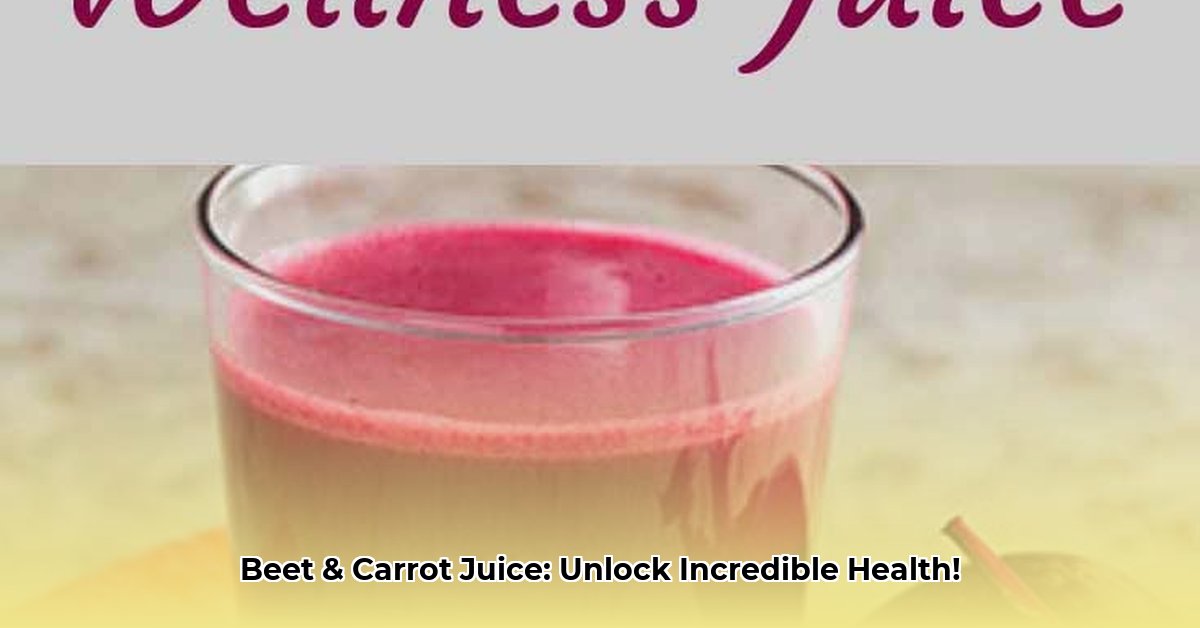
This vibrant juice blend isn't just a refreshing treat; it's a nutritional powerhouse packed with potential health benefits. This comprehensive guide explores the science behind beet and carrot juice, highlighting its advantages, potential risks, and how to safely incorporate it into your daily routine.
Understanding the Nutritional Powerhouse of Beet and Carrot Juice
Beet and carrot juice offers a concentrated dose of vitamins, minerals, and antioxidants. Carrots are rich in beta-carotene, easily converted to Vitamin A, vital for healthy vision and skin. Beets provide nitrates, which can impact blood pressure and potentially boost energy levels. This synergistic combination creates a potent nutrient blend.
Potential Health Benefits: What the Research Suggests
While more research is needed to fully understand the long-term effects, several studies suggest potential benefits:
- Heart Health: Beets' nitrate content may improve blood flow by relaxing blood vessels, potentially lowering blood pressure. However, further research is crucial to confirm the extent of these effects.
- Digestive Health: The high fiber content in both carrots and beets promotes healthy digestion and regularity.
- Energy Boost: Beet and carrot juice may provide sustained energy without the blood sugar spikes associated with other sugary drinks, thanks to carrots' low glycemic index and beets' moderate blood sugar effect. Moderation is key.
- Antioxidant Protection: The abundance of antioxidants helps combat free radicals, protecting cells from damage and potentially bolstering the immune system.
Potential Downsides and Precautions: A Balanced Perspective
While promising, it's vital to acknowledge potential drawbacks:
- Oxalates: Beets contain oxalates, which might pose concerns for individuals with a history of kidney stones.
- Nitrates and Medications: The relatively high nitrate content could interact with certain medications, particularly blood pressure drugs. Consultation with a doctor is recommended before incorporating beet and carrot juice into your diet if you are on medication.
- Sugar Content: Both carrots and beets contain natural sugars. Individuals with diabetes should monitor their intake carefully.
How to Safely Incorporate Beet and Carrot Juice into Your Daily Routine: A Step-by-Step Guide
To maximize benefits and minimize risks, follow these steps:
- Start Slowly: Begin with a small amount (e.g., half a cup) daily to observe your body's response. Individual reactions vary.
- Prioritize Quality: Choose fresh, high-quality produce whenever possible. The quality of ingredients directly impacts the nutritional value of the juice.
- Moderation is Crucial: Aim for a reasonable intake; one cup daily is a good starting point. Avoid overconsumption.
- Listen to Your Body: Pay close attention to any digestive discomfort, sugar spikes, or other unusual symptoms. Adjust your intake or discontinue use if necessary.
- Consult Your Doctor: If you have pre-existing health conditions, particularly kidney issues or diabetes, consult your doctor before regularly consuming beet and carrot juice.
The Bigger Picture: A Holistic Approach to Wellness
Remember, beet and carrot juice is a supplement, not a cure-all. It's most effective as part of a balanced diet and healthy lifestyle that includes regular exercise and adequate sleep. Consider it another tool in your overall wellness strategy.
"While beet and carrot juice offers promising potential health benefits, it's vital to remember that a holistic approach to wellness remains paramount," says Dr. Anya Sharma, Registered Dietitian at the Center for Nutritional Wellness. "A balanced diet, regular exercise, and stress management are equally crucial for optimal health."
Ongoing Research and Future Directions
Research continues to investigate the specific mechanisms by which beet and carrot juice impacts health. Future studies will likely focus on optimal dosages, long-term effects on various populations, and potential interactions with other foods and medications. Staying informed about these advancements will enhance our understanding of this nutritious beverage's benefits. This evolving knowledge will allow for more tailored recommendations as research progresses.
Key Takeaways: Beet and carrot juice offers a concentrated source of nutrients with potential cardiovascular, digestive, and energy-boosting benefits. However, mindful consumption, moderation, and awareness of potential interactions are key. Consult your healthcare provider if you have any concerns.